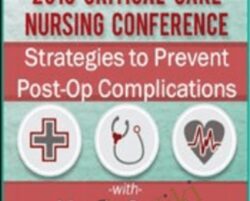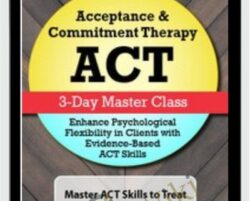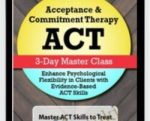Watch this breakthrough Acceptance and Commitment Therapy (ACT) master class to develop core competencies and transform your skills to achieve better therapeutic outcomes, even with your most challenging clients!You’ll learn how ACT weaves mindfulness strategies with cognitive-behavioral change strategies to revolutionize some of the toughest clinical conditions.This in-depth training includes step-by-step methods to:set an ACT consistent treatment planbuild an ACT skills repertoire to use immediately with any clientapply evidence-based ACT practices in a fluid and ongoing mannerClinicians, like you, are experiencing improved outcomes for a wide range of clinical conditions including anxiety, depression, trauma, PTSD, and personality disorders.Full of thought provoking lecture, engaging case studies and guided instruction, you will learn essential ACT skills that your clinical practice is missing to help your clients move forward in living a meaningful life. Leave this master class armed with tools you can use in your very next session.Purchase now to revolutionize your client outcomes with the flexible and fluid ACT approach!Develop a deep understanding of the theoretical and philosophical foundation of the ACT model to help clients increase psychological flexibility.Use knowledge base of ACT as a contextual behavioral science and how it differs from Cognitive Behavioral therapies.Detect the six psychological inflexible processes which maintain psychological rigidity and understand how it pulls clients away from value based behaviors.Formulate ACT consistent case conceptualizations to understand avoidance and how it relates to maintaining away moves related to value based behaviors.Utilize ACT case conceptualizations to prepare evidence-based treatment plans to assist with a cohesive treatment approach.Utilize the six psychological flexible processes in ACT to facilitate emotional openness and increase psychological flexibility in clients.Analyze how ACT attempts to undermine problematic language obstacles and implement clinical skills to assist clients with getting unhooked from their thoughts.Use metaphors, analogies, and experiential exercises to improve clients understanding of self and increase value-based behaviors.Implement ACT evidence-based protocols and processes into treatment for specific disorders including depression, anxiety, trauma and the personality disorders.Synthesize core ACT interventions, like defusion, mindfulness, acceptance and the observer self, to increase clients value-based behaviors.Utilize ACT interventions, like contacting the present moment, to assist with developing observation and awareness skills for your client.Integrate the role of self-compassion in the ACT model and utilize exercises to help clients build self-acceptance.Create an effective and valued therapeutic relationship through the use of compassion-focused therapy processes.Develop an understanding of the ACT extension models and integrate core ACT techniques to use with trauma, adolescents, groups and couples.Incorporate awareness training from the Crosshairs model to help clients with trauma to effectively identify painful thoughts and feelings and determine behaviors as being helpful or unhelpful in an effort to increase valued living.Implement the core skills from the DNA-V youth model, like mindfulness and action, to support personal growth and improve psychological problems in adolescent clients.Demonstrate how to implement the choice point skills useful for in-the-moment integration of CBT and ACT to assist clients to respond flexibly to the situations that occur outside of sessions.Integrate core self-compassion techniques and awareness training to assist your clients with effective interpersonal functioning and increasing satisfaction in interpersonal relationships.Utilize the ACT Matrix in session with groups and individuals in order to improve client engagement and strengthen commitment to values-consistent behaviors.Get Acceptance & Commitment Therapy (ACT): 3-Day Master Class – Jennifer Patterson, Only Price $237Master the Core Skills & Competencies of ACTThe ACT ModelWhat is Acceptance and Commitment TherapyEvolution of Third Wave Behavioral TherapiesOutcome StudiesFoundations of ACTContextual Behavioral SciencesFunctional ContextualismRelational Frame TheoryHappiness TrapImportance of Understanding for Clinical PracticeCase ConceptualizationExperiential Avoidance as the Core ProblemCreative Hopelessness ExercisesAssessment MeasuresACT Clinical InterviewInflexahex Diagnostic ModelLimitations of the Research and Potential RisksChildren and adolescentsAcute, florid hallucinationsCatatonic depressionIndividuals with an adverse reaction to mindfulness exercisesDiagnostic Model: Six Core Processes of Psychological InflexibilityExperiential AvoidanceLack of AwarenessUnclear ValuesUnhelpful BehaviorsAttachment to Conceptualized SelfCognitive FusionTreatment Model: Six Core Processes of Psychological FlexibilityAcceptanceMindful Decision MakingValues ClarificationValue-Based BehaviorsUnderstanding Sense-of-SelfDefusionInterventions and StrategiesEvidence-Based Processes and PracticesMindfulness Action PlanCommitment Plan WorksheetIntegration of Evidence-Based Models CBT, DBT, CFTRole PlayVideosCase PresentationsACT Treatment PlanningSuggestaflex ModelMetaphorsParadoxical ProcessesMindfulness TechniquesSelf-Compassion ExercisesAnd Much More!ACT in ActionTraumaFunction of Trauma SymptomsSpecify Treatment GoalsTarget Self-harm BehaviorsIncrease Psychological SafetyMindfulness ExercisesAnxiety12 Week ProtocolControl as the ProblemMindful Worry SheetFEAR AlgorithmFEEL Exposure WorkPersonality DisordersIncrease Emotional ToleranceValues ClarificationMind vs. ExperienceTarget the Client’s StoryWork with Client AngerRole of Therapist Self-disclosureDepression12 Week ProtocolReason GivingRuminationStory TellingDamaged Conceptualized SelfBehavioral ActivationACT Extension ModelsGroups & Individuals: The ACT MatrixSimple Format for Groups and IndividualsFive-sense ExperiencesMental ExperiencesToward MovesAway MovesThe Four QuadrantsTrauma Prevention & Treatment: The Crosshairs DiagramAwareness TrainingIdentify Painful Thoughts and FeelingsIdentify Situations as Being Helpful or UnhelpfulLiving Your Values at Work, Home, or in Other Important Areas of LifeAdolescents: The DNA-V ModelFor Adolescents, Parents, TeachersBased on Growth and DevelopmentUnderstand the 3 Processes and 2 Perspectives of ModelAssist Adolescent with Handling Difficult Thoughts, Feelings, and SituationDiscoverer RoleNoticer RoleAdvisor RoleOutside of Client Session: The Choice Point ModelUseful for In-the-moment Integration of CBT and ACTTarget Situation Selection and ModificationValues and Skills SectionModify the Form or Frequency of Inner ExperienceRespond Flexibly to the Situation and the Inner ExperienceHelp the Client Identify and Use StrengthsCouples: The ID ModelAssists with Conceptualization and Treatment of Interpersonal Relationship IssuesSelf-dislikeLack of InsightEmotional Avoidance or Attachment to Emotional ExperienceSelf-compassionSelf-awarenessSelf-acceptanceGet Acceptance & Commitment Therapy (ACT): 3-Day Master Class – Jennifer Patterson, Only Price $237Tag: Acceptance & Commitment Therapy (ACT): 3-Day Master Class – Jennifer Patterson Review. Acceptance & Commitment Therapy (ACT): 3-Day Master Class – Jennifer Patterson download. Acceptance & Commitment Therapy (ACT): 3-Day Master Class – Jennifer Patterson discount.
 Visual Literacy Skills: How to See – Carrie Patterson
₹7,968.00
Visual Literacy Skills: How to See – Carrie Patterson
₹7,968.00
 Strategies to Prevent Post-Op Complications – Marcia Gamaly
₹4,316.00
Strategies to Prevent Post-Op Complications – Marcia Gamaly
₹4,316.00
Acceptance & Commitment Therapy (ACT): 3-Day Master Class – Jennifer Patterson
₹38,678.00






